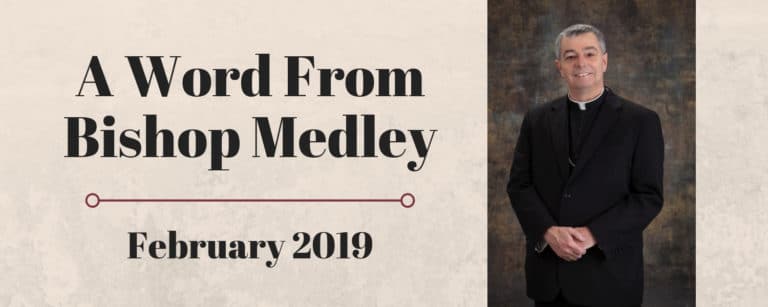St. Blaise lived during the fourth century. Very little is known about his life, but according to customary accounts he was a physician before becoming a bishop. He was the Bishop of Sebaste in Armenia. At least since the eighth century he has been identified with the Catholic Church’s healing ministry because he was reputed to have miraculously cured a small boy who nearly died because of a fishbone in his throat.
His feast day is February 3 and it is customary on this day for the faithful to have their throats blessed according to ritual. Two candles are tied together in the form of cross. The unlit candles are touched to the throat and the following prayer is said: “Through the intercession of Saint Blaise, bishop and martyr, may God deliver you from every disease of the throat and from every other illness: In the name of the Father, and of the Son and of the Holy Spirit.”
The blessing of throats is but one blessing ritual of the Catholic Church. Such blessings are counted among the Church’s rich tradition of sacramentals. So, what are sacramentals?
To define sacramentals we should define the far more commonly-referenced sacraments. The Seven Sacraments typically celebrate peak moments of human life, such as birth (baptism), marriage (matrimony), and extraordinary calls to service (Holy Orders). Some Sacraments are intended to sanctify us regularly, such as Holy Eucharist and Reconciliation.
Sacramentals are objects or experiences that are important ways to sanctify the daily moments of our lives. Among well-known sacramentals are crucifixes, holy water, rosaries, blessed medals, scapulars, and more. Among these are simple blessings such the blessing of throats, the reception of Blessed Ashes on Ash Wednesday, and the Blessed Palms received on Palm Sunday. These objects or experiences sanctify us.
Last Christmas I gave the gift of a new book to all of our priests. The book is “The Priestly Blessing: Rediscovering the Gift” by Fr. Stephen Rosetti. Fr. Rosetti challenges priests and the faithful to rediscover a renewed theology of priestly blessing and to embrace the habit of blessing people, objects and events.
In our ever-so-sophisticated life in the 21st century we may have grown lax about blessings. Perhaps we have feared that our rich custom of blessings might be confused with notions of magic. That could be a real danger but at the same time we may acknowledge that the hopes and fears of people in our age are not so different from those of hundreds and even thousands of years ago. In fact, blessings date back to the Old Testament. In reality such rituals and invocations are to be found in many ancient cultures, signifying an innate understanding among human persons that there is a source of life and goodness and that source is divine.
The Catholic Church has scores of prescribed blessings for people, for buildings and human activities, objects and religious articles. Perhaps the most well-known blessing is a universal one. When a person sneezes we almost instinctively say, “God bless you.” This may be just a habit and it may be invoked by those of no particular faith or practice. At the same time can it not be a subtle but real acknowledgement of God as the source of blessing? We see a person in need and might say, “Oh bless your heart.” While these may not always be conscious acts of faith or prayer, perhaps we can all strive to assure that they are genuine and often enough a real act of faith, hope and love.
In the Rite of Infant Baptism the priest or deacon invites the parents and godparents to trace a cross on the forehead of the baby. No words are required. I have always told parents that they should repeat this symbol and action every single day until children learn to make the Sign of the Cross for themselves. If they have quietly spoken the words “In the name of the Father, and of the Son, and of the Holy Spirit,” they will never have to intentionally teach those words.
I recall a mother who told me that when her children were in bed each night she would go to them to sign them with the cross. Sometimes they were awake, sometimes asleep. At some point, perhaps when the teenagers were always awake after Mom, the practice slipped away. One day her 14-year-old son asked, “Mom, why don’t you bless me anymore?”
We never outgrow needing God’s blessings.
Most Reverend William F. Medley
Diocese of Owensboro
Originally printed in the February 2019 issue of The Western Kentucky Catholic.
Copyright © 2019 Diocese of Owensboro/The Western Kentucky Catholic


